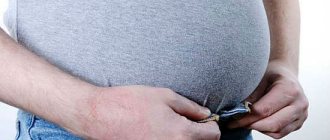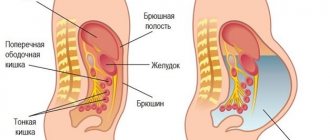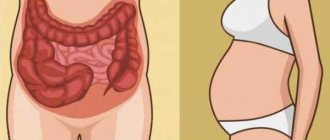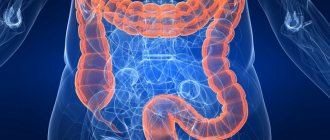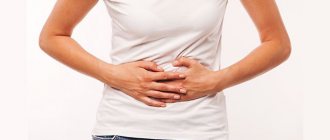What is bloating?
Bloating (flatulence) is an accumulation of gases in the intestines due to indigestion. This process is most often accompanied by bloating, an increase in the volume of the abdomen and an unpleasant feeling of distension from the inside.
Without a doubt, we have all experienced this to one degree or another and know very well what inconvenience this illness can cause. The intestines filled with gases create a feeling of a full stomach, and the colic caused by this brings a lot of trouble, making us feel uncomfortable.
Flatulence also occurs in healthy people, but most often it is a manifestation of other, more serious diseases of the gastrointestinal tract. Gases in the intestines can accumulate due to pathologies such as:
- chronic pancreatitis – the body lacks the enzymes produced by the pancreas and, as a result, bloating appears after eating any type of food.
- irritable bowel syndrome – there is a violation of the motor function of the intestines, bloating in this case is accompanied by pain,
- dysbacteriosis – the balance of microflora is disturbed, and harmful microorganisms begin to produce gases (methane, hydrogen sulfide, ammonia),
- lactose intolerance – the body of adults often lacks enzymes that facilitate the absorption of lactose (milk sugar),
- intestinal obstruction - the passage of gases may be difficult due to the development of a tumor or polyps.
It is possible to temporarily get rid of bloating at home, but it is better to find the root cause of the disease together with your doctor. Remember that traditional medicine is not a substitute for primary therapy, but only an addition to it.
Unconventional treatment
Traditional medicine methods for treating bloating in the upper abdomen are harmless to the body, accessible to everyone and quite effective. Basic recipes for preparing medicinal products at home:
- Chamomile tea. A tablespoon of crushed dried flowers of the plant should be poured into a glass of water, boiled, after 5-7 minutes removed from the stove, tightly closed, left for half an hour and then cooled. Take a quarter glass several times a day on an empty stomach.
- Dill water . The fruits of dill or fennel should be poured with hot water in a ratio of 4-5 tablespoons per 1 liter of liquid, left for about 3 hours, and strained. Take half a glass of warm drink 3-4 times a day before meals or between meals.
- Caraway infusion: pour 2 dessert spoons of caraway seeds into 400 ml of hot water, close, leave to infuse for 2-3 hours. Take 100 ml of infusion 3-4 times a day. Cumin can be combined with chamomile flowers, oregano herb, and valerian root.
- Crushed ginger root is added little by little to any herbal or green tea.
- Dandelion root infusion: pour 10 g of raw material with a glass of boiling water, leave for about half an hour, take 20 ml several times during the day.
- Parsley root decoction: pour a teaspoon of chopped raw material into 1 glass of water, leave for about half an hour, boil, cool and take 2 tablespoons several times a day.
- Tea or infusion of St. John's wort, yarrow or wormwood also helps get rid of bloating and has an antispasmodic, calming effect. For 250-300 ml of boiling water you will need 1 tablespoon of plant material. After cooling, the drink is filtered and drunk twice a day.
Non-traditional remedies are quite effective in combating bloating. But, if the symptoms do not go away with self-treatment, an increase in pain, fever, general weakness, increased heart rate, shortness of breath develops, you must quickly consult a doctor to exclude a serious pathology.
Causes of bloating
Diet as the main cause of bloating
- Very often, excessive consumption of various types of carbonated drinks leads to excessive accumulation of gases in the esophagus. Usually, such bloating goes away without causing any particular inconvenience, since gases in a healthy person are quickly absorbed by the intestinal walls or eliminated physiologically.
- It is also possible for air to enter the stomach in large portions while eating. Therefore, you should not rush while eating food.
- Remember that some foods, consumed in large quantities, cause a fermentation reaction and, as a result, gas formation. To avoid undesirable consequences, you should moderate your consumption of sweets and baked goods, brown bread, beans, potatoes and other foods containing large amounts of easily digestible carbohydrates, fiber or starch.
- Another reason for the accumulation of gases is the mixing of foods that should be eaten separately from each other. This is especially true for fruits, which should be eaten either an hour before the main meal, or no earlier than 2 hours after a meal.
Sometimes the cause of bloating can be an attempt to get rid of heartburn by drinking soda, since it neutralizes the acidic environment of gastric juice and provokes increased gas formation.
Celiac disease
Bloating is also the main symptom of a rare disease called celiac disease. According to statistics, in Russia 1 person out of 1000 suffers from celiac disease. With celiac disease, gluten is not completely broken down, forming toxic substances that damage the inner surface of the intestine. It is treated exclusively with a gluten-free diet, or by constantly taking enzyme preparations that will help break down gluten.
Read more: What is celiac disease?
Prevention
To prevent many diseases, as well as excessive gas formation, doctors recommend leading a healthy lifestyle. Meals should be frequent, but their volume should be small. Breakfast, lunch, dinner and snacks in between should be mandatory. Overeating leads to obesity and various types of chronic diseases, such as diabetes and coronary heart disease. Bloating is sometimes the most harmless of them all.
Nutritionists advise that the amount of water you drink per day should not be less than two liters. The last meal should preferably be no later than three hours before bedtime. The diet should contain foods containing fiber. Flour products and baked goods are not advisable in the daily diet, as they cause fermentation in the intestines.
Nutritionists even recommend giving up coffee, nuts, seeds, and especially beer and other alcoholic beverages. Choose lean meat varieties (chicken, rabbit, turkey). Eat grains more often in the form of porridges. If it is difficult to give up baked goods, then it is better to eat yesterday’s bread rather than fresh. Although legumes, cabbage and other plant foods are products that cause gas, moderate amounts of them in the human diet are only beneficial.
Related video: Bloating
Symptoms of bloating
Most often, bloating is not an independent disease, but only a symptom of other, more serious diseases of the digestive system.
Excessive formation of gases in the intestines is possible with chronic pancreatitis, a disease in which the body lacks enzymes produced by the pancreas. In this case, bloating usually occurs after eating, regardless of its composition.
Flatulence can also be caused by irritable bowel syndrome. In this case, the motor function of an anatomically healthy intestine is disrupted, and bloating is accompanied by abdominal pain, and in some cases also diarrhea or constipation.
The cause of bloating may be intestinal obstruction caused by a tumor or polyps. In this case, the passage of gases from the intestines becomes difficult and leads to flatulence.
Excessive gas formation may be a consequence of intestinal dysbiosis. Due to a decrease in the protective properties of the body, microflora is disrupted in the large intestine. Harmful microbes that enter there produce gases in large quantities (mainly ammonia, methane and hydrogen sulfide). This process leads to bloating, accompanied by a foul odor.
Also, flatulence often accompanies individual lactose intolerance - a condition in which the body lacks enzymes that allow a person to digest dairy products.
Bloating and abdominal pain. The pain is usually short-term but painful. The discomfort goes away when the gas passes through the intestines. Pain can occur at various points in the abdominal cavity and, passing through the intestines, change location. If you experience prolonged and intense pain over a long period of time, this may be a signal that the cause is not bloating, but some more serious illness.
Prevention of unpleasant symptoms
A healthy person with bloating does not need special treatment. If you are concerned about this unpleasant disease, you need to follow some tips:
- Chew food thoroughly and avoid drinks that contain carbon dioxide. Eat only at certain times, often and in small portions.
- Eat only foods that are easily processed. If this unpleasant symptom recurs often, you need to give up coffee, chocolate, and sugar. These products provoke fermentation processes in the colon and increase bloating in the abdominal cavity.
- Sit up straight while eating; you don’t need to put pressure on your stomach while it’s working.
- Watch your weight. People who are obese should reduce the amount of junk food they eat.
- Do not eat, for example, vegetables and fruits at the same meal.
- Eliminate from your daily diet foods that increase the amount of gas (beans, cabbage, onions).
- Do not drink alcohol, milk, or foods that complicate the process of processing food.
- Move more, do physical exercises, you can do yoga.
- For PMS (premenstrual syndrome), you can take B vitamins. Abdominal bloating is reduced due to the accumulation of fluid in the stomach. If tympany is also accompanied by persistent pain, you can lie down on the sofa, putting a warm compress on your aching stomach, or use essential oils to perform a relaxing massage.
- Drink as much water as possible, and forget about all kinds of soda.
In order to remove the causes of flatulence, and the treatment gave results, you need to adhere to a certain diet, including carrots, fermented milk products, boiled cereals (buckwheat), beets, reduce the amount of fried meat and sweet fruits (apples, citrus fruits).
Diet for this disease should include a minimum amount of raw vegetables. It is better to bake or steam them, this will help absorption.
Diets and irregular meals disrupt the functioning of the digestive system.
If you have a sedentary lifestyle, to reduce abdominal bloating, reduce pain, and straighten your colon, you need to get up and walk around a little.
If you are constipated, you should not constantly give enemas or drink laxatives. This will worsen the cause of flatulence.
You can do fasting days on rice or kefir. It is recommended to drink only kefir all day or eat pre-boiled rice. This will help not only adjust the functioning of the colon, but also remove harmful substances.
Only a medical professional can tell you how to treat flatulence. Contact a specialist and he will show you the right path to recovery. And remember that timely seeking help from doctors will save you from many unpleasant consequences that can even lead to death.
Bloating after eating
In most cases, flatulence is associated with poor diet. In a healthy person, bloating can be caused by accidentally swallowing a large portion of air with food, or by drinking highly carbonated drinks. Also, unpleasant sensations can occur if a particular food is poorly absorbed by the body. Therefore, instead of being digested, it begins to form gases.
Another cause of bloating may be dairy foods. To digest this type of food, the enzyme lactose is needed. If there is insufficient quantity, milk and similar products can cause discomfort. The cause may also be products made from coarse fiber or starch, for example, seeds, cabbage, potatoes, nuts, oats. If flatulence occurs frequently, such products should be excluded. And, if you consume them, you should remember that these types of products must be chewed very carefully, otherwise discomfort may occur.
General recommendations for treatment and prevention
The simplest ways to treat stomach bloating after eating, which do not require the cost of medication, are the following:
- proper nutrition;
- reducing fatty and carbohydrate foods in the diet;
- regular exercise, walking;
- self-massage of the abdomen in a clockwise circular motion;
- breathing exercises;
- warm compresses on the abdominal area to relax the intestinal muscles.
These techniques allow you to fight flatulence on your own, and are often enough to treat bloating.
What to do if you have bloating?
One day after bloating, you should give your intestines a rest. You should only eat boiled rice and wash it down with herbal teas. Subsequently, you should reconsider your diet. For meat, you should give preference to chicken, turkey and veal, and for cereals, rice. Milk should be replaced with fermented milk products (cheese, yoghurt). You need to drink teas made from mint, St. John's wort and chamomile. It is good to add spices and herbs to dishes that reduce gas formation: ginger, cumin, cardamom, parsley, dill, fennel.
To understand which specific foods cause bloating, you should focus on your feelings. Monitor the sensations you experience while taking a particular product and draw conclusions. Medical intervention, in most cases, is limited to taking enzyme preparations. And if infection or bacteria in the gastrointestinal tract is suspected, antibiotics are prescribed.

